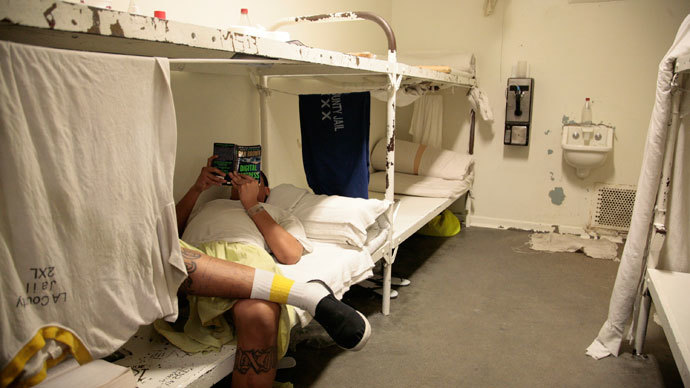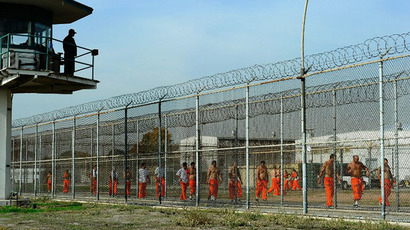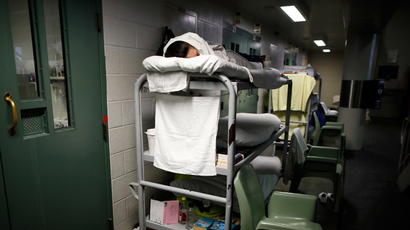Dozens of California prisoners hospitalized after 40 days of hunger strike

Dozens of inmates on a hunger strike in California prisons have been hospitalized – 40 days into an organized fast by 200 prisoners. The inmates are protesting state prison conditions, including increasing reliance on solitary confinement as a punishment.
Prison doctors say they fear for the health of 118 prisoners who
have been on continuous hunger strike since July 8, when tens of
thousands of inmates in California prisons refused breakfast.
The units, where prisoners are kept in cells for 23 hours per day
and allowed an hour of solitary exercise in an enclosed yard,
have raised concerns from human rights activists, who argue that
prisoners are harmed by a lack of social interaction.
According to nutritionists, by the 40th day of refusing food
inmates will be suffering from a series of medical and
psychological problems, some of which may cause irreparable
damage to their health.
"Everything shrinks and the body tends to be starving and just
about nothing else," Dr. Marc Hellerstein, who studies
nutrition at the University of California, Berkeley told Reuters.
"They will have less judgment, they will have less interest,
they will become socially withdrawn and isolated. They just want
to curl up in a corner."
The receiver's office has not published the total number of
inmates who began eating again after falling ill, but strike
participation is dropping. According to officials, 292 inmates
remained on hunger strike Monday, including 144 continuously
since the action began. By Thursday, 226 were on hunger striker,
118 continuously.

Among the complaints sending inmates to hospital are dehydration,
cramping, vomiting, diarrhea, dizziness and lightheadedness.
"It can have long-term effects on your internal organs as your
body is pretty much eating itself from the inside out," said
Liz Gransee, a spokeswoman for the federal receiver overseeing
care in the state's prisons.
One inmate who participated in the hunger strike has died in
solitary confinement. Thirty-two year old William Sell ended his
hunger strike on July 21, but hanged himself the next day. He was
serving a life sentence for attempted murder, and was awaiting
trial for the murder of a cellmate. Prison rights activists said
his death was a result of his participation in the fasting.
The hunger strike is aimed at improving conditions at four Secure
Housing Units where over 4,500 inmates are held in
near-isolation, some for committing crimes while incarcerated and
others believed to be gang members.
The protest has already gone on twice as long as a similar hunger
strike in 2011. More than 30,000 convicts refused meals in the
first days of the mass strike. Numbers have dramatically dropped
since then, with roughly 1,000 inmates at 11 prisons
participating 20 days later.
Amnesty International has called on the US Justice Department to
stop punishing California prison hunger strikers who are
protesting unregulated solitary confinement policies.

“Prisoners seeking an end to inhumane conditions should not be
subjected to punitive measures for exercising their right to
engage in peaceful protest,” Amnesty International’s USA
researcher Angela Wright said. “Prolonged isolation under
conditions which can only be described as cruel and inhumane
treatment is prohibited under international law.”
Earlier this month, despite warnings from California officials,
the Supreme Court gave the go-ahead for the early release of
nearly 10,000 California inmates by year's end to ease
overcrowding at 33 adult prisons. The court dismissed a complaint
by California Governor Jerry Brown seeking to halt the early
release, which had been approved by a lower court. Brown argued
that releasing 10,000 inmates would mean letting violent
criminals out on the streets.
A panel of three federal judges had previously ordered the state
to cut its prison population by nearly 8 percent to roughly
110,000 inmates by December 31 to avoid conditions amounting to
cruel and unusual punishment. That panel, responding to decades
of lawsuits filed by inmates, repeatedly ordered early releases
after finding inmates were needlessly dying and suffering because
of inadequate medical and mental health care caused by
overcrowding, AP reported. Court-appointed experts discovered
that the prison system had a suicide rate that worsened last year
to 24 per 100,000 inmates, far in excess of the national average
in state prisons of 16 suicides per 100,000 inmates.














